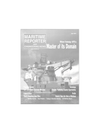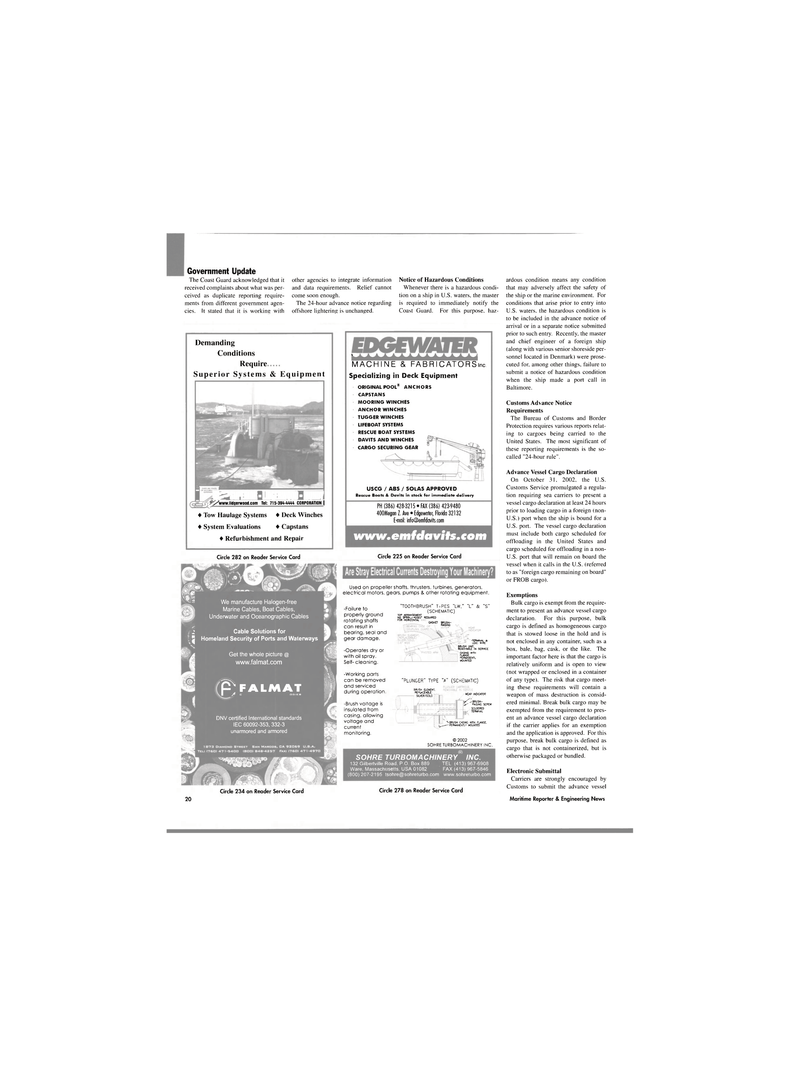
Page 20: of Maritime Reporter Magazine (April 2003)
Read this page in Pdf, Flash or Html5 edition of April 2003 Maritime Reporter Magazine
Government Update
The Coast Guard acknowledged that it received complaints about what was per- ceived as duplicate reporting require- ments from different government agen- cies. It stated that it is workins with other agencies to integrate information and data requirements. Relief cannot come soon enough.
The 24-hour advance notice regarding offshore lightering is unchanged.
Notice of Hazardous Conditions
Whenever there is a hazardous condi- tion on a ship in U.S. waters, the master is required to immediately notify the
Coast Guard. For this purpose, haz-
Demanding
Conditions
Require
Superior Systems & Equipment ^SUPERIOR-LIDGERWOOD-MUNDY ^Ww.lidgerwQQd.com Tel: 715-394-4444 CORPORATION | • Tow Haulage Systems • Deck Winches • System Evaluations • Capstans • Refurbishment and Repair
Circle 282 on Reader Service Card ® We manufacture Halogen-free
Marine Cables, Boat Cables,
Underwater and Oceanographic Cables 2 Cable Solutions for | Homeland Security of Ports and Waterways
Get the whole picture @ www.falmat.com
P> FALMAT
I J* CUSTOM CABLE TECHNOLQQIEB
DNV certified International standards
IEC 60092-353, 332-3 unarmored and armored
L
MACHINE & FABRICATORSinc
Specializing in Deck Equipment
ORIGINAL POOL® ANCHORS
CAPSTANS
MOORING WINCHES
ANCHOR WINCHES
TUGGER WINCHES
LIFEBOAT SYSTEMS
RESCUE BOAT SYSTEMS
DAVITS AND WINCHES
CARGO SECURING GEAR
USCG / ABS / SOLAS APPROVED
Rescue Boats & Davits in stock for immediate delivery
PH (386) 428-3215 • FAX (386) 423-9480 400Megan Z. Ave • Edgewoter, Florida 32132
Email: [email protected] www.emfdaviis.€om
Circle 225 on Reader Service Card
Used on propeller shafts, thrusters, turbines, generators, electrical motors, gears, pumps & other rotating equipment. -Failure to properly ground rotating shafts can result in bearing, seal and gear damage. -Operates dry or with oil spray.
Self- cleaning. -Working parts can be removed and serviced during operation. -Brush voltage is insulated from casing, allowing voltage and current monitoring. "TOOTHBRUSH" T;PES "LW." "L" & "S" (SCHEMATIC)
TOP ARRANGEMENT
NO 3PRlN,-t2S'5T REOUIRED
FOR HORIZONTAL
GASKET BRUSH-
RAISING -TERMINAL &
LEA.:.' WIPE
BRUSH UNIT,
REMOVABLE N SERVICE
CA&NG WITH
FLANGE.
PERMANENTL
MOUNTED "PLUNGER" TYPE "A" (SCHEMATIC)
BRUSH ELEMENT,
REPLACEABLE
SILVER/GOLD WEAR INDICATOR i^BRUSH-
U-' PMSING SCREW
SOLDERED
TERMINAL ^ BRUSH CASING WITtl FLANGE.
PERMANENTLY MOUHTEO ©2002
SOHRE TURBOMACHINERY INC.
Circle 234 on Reader Service Card
SOHRE TURBOMACHINERY INC. 132 Gilbertville Road, P.O. Box 889 TEL (413) 967-6908
Ware, Massachusetts, USA 01082 FAX (413) 967-5846 (800)207-2195 [email protected] www.sohreturbo.com
Circle 278 on Reader Service Card 20 ardous condition means any condition that may adversely affect the safety of the ship or the marine environment. For conditions that arise prior to entry into
U.S. waters, the hazardous condition is to be included in the advance notice of arrival or in a separate notice submitted prior to such entry. Recently, the master and chief engineer of a foreign ship (along with various senior shoreside per- sonnel located in Denmark) were prose- cuted for. among other things, failure to submit a notice of hazardous condition when the ship made a port call in
Baltimore.
Customs Advance Notice
Requirements
The Bureau of Customs and Border
Protection requires various reports relat- ing to cargoes being carried to the
United States. The most significant of these reporting requirements is the so- called "24-hour rule".
Advance Vessel Cargo Declaration
On October 31. 2002, the U.S.
Customs Service promulgated a regula- tion requiring sea carriers to present a vessel cargo declaration at least 24 hours prior to loading cargo in a foreign (non-
U.S.) port when the ship is bound for a
U.S. port. The vessel cargo declaration must include both cargo scheduled for offloading in the United States and cargo scheduled for offloading in a non-
U.S. port that will remain on board the vessel when it calls in the U.S. (referred to as "foreign cargo remaining on board" or FROB cargo).
Exemptions
Bulk cargo is exempt from the require- ment to present an advance vessel cargo declaration. For this purpose, bulk cargo is defined as homogeneous cargo that is stowed loose in the hold and is not enclosed in any container, such as a box, bale, bag, cask, or the like. The important factor here is that the cargo is relatively uniform and is open to view (not wrapped or enclosed in a container of any type). The risk that cargo meet- ing these requirements will contain a weapon of mass destruction is consid- ered minimal. Break bulk cargo may be exempted from the requirement to pres- ent an advance vessel cargo declaration if the carrier applies for an exemption and the application is approved. For this purpose, break bulk cargo is defined as cargo that is not containerized, but is otherwise packaged or bundled.
Electronic Submittal
Carriers are strongly encouraged by
Customs to submit the advance vessel
Maritime Reporter & Engineering News

 19
19

 21
21
